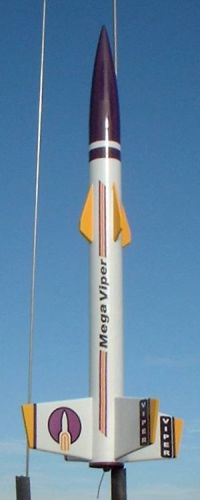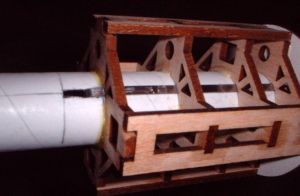| Construction Rating: | starstarstarstarstar_border |
| Flight Rating: | starstarstarstarstar_border |
| Overall Rating: | starstarstarstarstar_border |
| Manufacturer: | Qmodeling  |

Brief:
This fantastic upscale of the Estes EAC Viper is the first of Q-Modeling's
"QBAR" projects. Through collaboration with a born again rocketeer
(Bob Cox) and a rigorous beta testing process, they hope to release flawless
and innovative designs. In this case, I believe they have succeeded.
Construction:
I was fortunate enough to have won this beauty on EMRR's Virtual Rocket Reunion
contest. The bitter irony of receiving a great prize developed in part by my
virtual arch rival was not lost on the gang at Q-Modelling. Once the Viper was
actually released, my kit showed up well packed in the familiar Priority Mail
triangular box.
Parts list includes:
- Resin cast nose cone
- 2 BT-80 tubes (one slotted)
- TC-80 coupler
- 8 Laser-cut balsa fins
- 24mm foil-lined motor tube
- Motor mount assembly
- 30" nylon chute (Top Flight)
- Nomex® heat shield (from Top Flite)
- Kevlar® shock cord
- Waterslide decals
Parts were all very good quality. My motor mount had incorrect fin braces, which were quickly replaced.
The instructions are clearly written and are very easy to follow with a good number of key details and tips along the way. One nice new feature is the color header page, showing the finished design in full color. The back of that page includes a detailed paint/color scheme.
 This kit makes
use of one of my favorite Q-Modeling innovations: the sliding/retracting motor
hook. By slotting the motor tube, you're able to push the hook up flush to the
bottom of the body tube when there's no motor. This allows the rocket to stand
flush on the ground. The rest of the motor tube assembly is the typical
Q-Modeling laser-cut balsa framework and brace combination. It looks fairly
complicated, but goes together fairly easily once you've read the instructions.
Of course, having the proper parts helps, as I didn't discover the error until
I tried to dry-fit the through-the-wall fins.
This kit makes
use of one of my favorite Q-Modeling innovations: the sliding/retracting motor
hook. By slotting the motor tube, you're able to push the hook up flush to the
bottom of the body tube when there's no motor. This allows the rocket to stand
flush on the ground. The rest of the motor tube assembly is the typical
Q-Modeling laser-cut balsa framework and brace combination. It looks fairly
complicated, but goes together fairly easily once you've read the instructions.
Of course, having the proper parts helps, as I didn't discover the error until
I tried to dry-fit the through-the-wall fins.
Once the motor tube assembly is completed and the centering rings are installed, it's time to tie the Kevlar® anchor to the upper centering ring and motor tube.
Before gluing the motor mount into the body tube, it's a good idea to dry fit the fins. This should be standard practice for any through-wall construction. Once you're comfortable with the fit, bond the assembly using wood glue.
Next up is mounting the fins. Wanting to make sure I had an absolutely beautiful finish, I dropped a couple hours into sealing and sanding the fins before mounting them. In this case, I used diluted Elmer's Wood Filler, two coats with plenty of sanding in between. For fillets, I used my usual yellow glue base, and a white glue second application since the white glue doesn't shrink and leaves a smoother finished appearance.
I also made sure to fill the tube spirals before bonding the fins, since it's easier to sand without the fins in the way. The same mix of diluted wood filler was used, although less diluted than my sealer on the fins.
The body tube is actually a 2 piece assembly, so you must bond the upper and lower tubes using a coupler. I have mixed feelings about this. Although am generally opposed to the two-piece design and wish it had been one-piece. The argument in favor of the two-piece design is economics (it uses the same tube as the Bullpup and fits in a smaller bag/box), plus it makes it easier to fillet the upper centering ring around the motor tube. The argument against it is the tube seam and added hassle trying to hide it.
The upper fins need to be carefully aligned with the lower fins. With thicker fins, mere alignment lines generally aren't good enough, so I use a metal angle and clothespins to anchor the angle to the lower fins and then pin on the upper fins.
Construction basically wraps up with one other nice feature. There's a centering ring bonded in the upper tube that serves as a retainer for the recovery pack. This prevents the CG shift in flight from a heavy chute and Nomex® shield sliding back to the aft end of the rocket.
Finishing:
Finishing for this rocket is fairly challenging and requires a good deal of
skill to get it right. As previously mentioned, there's a lot of balsa grain
and tube spiral work plus that nasty tube seam.
Once the surface was prepped, I applied a light coat of Plasti-Cote primer, then essentially sanded most of it off. I followed up with a light Krylon primer coat, light sanding with 400 grit, and three coats of gloss white while wet/dry sanding with 600 grit between coats.
There are two accent colors on this design, so good masking is a requirement. I started with the yellow--the upper fins are completely yellow and the lower fins get yellow tips. After allowing the two yellow coats a couple of days to dry, I then masked off for the purple, using the expensive blue painter's tape (due to its much lower tack than regular masking tape). The nose cone and upper inch of body tube are purple, plus there is a 1" stripe towards the tip of the body tube, 1/4" trim stripes against the yellow on the lower fins, and a 1/4" stripe around the bottom of the tube. The lower stripe was especially annoying to mask, as there was less than half an inch below the fins, so very little area for applying any decent masking tape. I think this could have been done better with either purple stripe decals, pin striping, or possibly Monokote.
The decals are very good quality, but are solid ink transfer so do not dip them straight into water. They need a light clear coat application first. Not being experienced with this type of decal, I went a little too heavy on the clear coat, so my beautiful decals ran a little bit. After the clear coat has completely dried, they apply as ordinary waterslide decals.
Construction Rating: 4 out of 5
Flight:
The instructions suggest E9-4 or F21-6, with F21 being the most strongly
recommended. I had a couple spare Ellis Mountain E12-6s though and preferred to
avoid the very pricey AeroTech motors.
First flight was on a breezy afternoon with winds hovering around 8-10mph. This lead to a slight weathercock, although it wasn't too bad. The rocket climbed slowly to about 300-350 feet, arced over, and I got to count to at least 8 while kicking myself for a poor delay choice. When the ejection finally kicked, the rocket was more than halfway back down and actually whistling. The chute whipped out and the Kevlar® cord sliced its way through the body tube, stopping just above the tube coupler. The zipper trashed what was an otherwise magnificent design and work of craftsmanship.

Recovery:
Other than my boneheaded choice of delay, the flight was fine, and the recovery
package is the best in the mid-power class.
Flight Rating: 4 out of 5
Summary:
This is an excellent rocket kit and beautiful design. The pro's are excellent
parts, and quality of design. Cons would be the two-piece tube. Also, having
now zippered a pair of Q-Modeling BT-80 products, I think I'm going to start
bashing future designs with Kevlar®
to the top of the tube, joined to heavy elastic up to the cone. That way, I'll
just have dents from the cone whipping back.
Overall Rating: 4 out of 5
 |
 |
Flights
Sponsored Ads
-
Estes Mini A Heli - eBay Auction -
Current Bid: $5.00 (Bids: 3) -
Quest HL-20 Lifting Body
(OOP) - eBay Auction -
Current Bid: $12.50 (Bids: 3) -
Estes Cobra (OOP) - eBay Auction -
Current Bid: $20.50 (Bids: 6) -
Vintage US Rockets Mega Roc Instructions And
Decal - eBay Auction -
Current Bid: $0.99 (Bids: 0)
 |
 |



